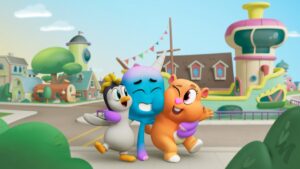So let’s end the week with this, shall we?
So you want to make a Canadian cartoon….
More from commentaryMore posts in commentary »
- TAAFI Industry Conference 2023. The kind of event we need right now. November 2-4
- Fake Film Festivals: Learn How To Spot a Scam
- Animation Job Hunting in a Downturn: Use LinkedIn. Seriously.
- NFB’s HOTHOUSE 14 is Seeking Submissions!
- more From the Internets! Mercury Teams with Stim Studios, and I use it as an opportunity to talk about the state of the animation industry in Canada.






This is a documentary, right?
Based on a true story.
Sigh…
Great post Mike. Is this an actual conversation that took place? Or is it a Mock up of what really goes on in Canadian television?
good times.
To add something more substantive to my original point:
I’m pretty sure everyone here has worked in a studio, where you worked alongside people who were tremendously talented, but none of that creativity and talent ever made it to the final screen. After wild originality gets chopped and screwed and watered down to fit the ‘style’ of whatever you’re working on, the end result ends up being predictable and often boring. That’s not a criticism, exactly of the industry, but it is what happens in large cases. Each show has a style and that style is heavily determined by the perceived expectations of the audience and the expectations of the show’s runners (the people who have to sell it to investors, or networks and ultimately the advertisers).
I like to use the Transformers example: I am on record as saying that I hated the live-action movie with a passion. Yet, if it were MY million dollars, would I really want to risk it on a true science-fiction epic with intelligence and nuanced relationships and a story that ultimately asked larger questions the nature of humanity? Sadly, it’s much easier to get Megan Fox in a half-open shirt and go collect my profits. So I can understand why there is a strong lack of appetite for ‘risk’ among Canadian execs. I am certain that there is a fear that a risky show that is too controversial or too challenging can get the makers into a lot of trouble. Plus, when you go hat-in-hand to the government, they’re going to want to exert some control since they’re giving public money to private companies. If the show is too racy, the public may demand to know why it received public funding. A severe backlash could see future budgets affected negatively.
I am certain there are even more factors involved than I’m aware of, but the details are not as important as the reality that he who has the gold makes the rules.
This brings me to the problem of animation: It takes a lot of gold.
Animation is expensive. My friends from animation schools wanted to run studios when they were in school and then once they graduated they just wanted to get a job and pay back their student loans. Some artists work independently and have found success, but not everyone is a triple-threat. Some of us require help if we were to make a film or a cartoon show. Sadly not everyone has 10 friends who will come over and animate for free on evenings and weekends and eventually put out a full-length feature film in 2-3 years (or more). Plus once you make the film, there’s marketing and advertising and there’s a fight to get it onto Canadian film screens. We haven’t even talked about how you are going to just break even, let alone make a real profit from your film. To call the process of trying to create a serial cartoon show or feature film a ‘daunting’ prospect is putting it mildly, in my opinion.
So how does one get their ideas out there, without needing to win the Lotto?
I don’t know the answer.
For me, my solution was to start the Mosaik Project. Not to plug, but it is relevant because it was my solution to this exact problem. I wanted to promote independent work directly to the audience. No middle-man, no government safety net. I could never afford to make my own cartoons and market them online and hope to build an audience. It would take too long and would require too much money, but comics are cheap. They are the cheapest and most accessible form of literature on the planet. It’s one of the few mediums where money counts for less than talent. And so I convinced a few friends of mine who could draw and were crazy enough to spend their free time drawing storyboard panels and doing character designs, to take a chance with me. Ultimately we’re banking everything on the response of the audience to overlook whatever shortcomings we have and appreciate the fact that they’re getting independent content that hasn’t been ‘sanitized for their protection’. Personally, I hope that if we can stabilize ourselves as a new medium, other artists would come on board and do creator-owned work because while it isn’t full animation, they could do what they wanted and bypass the system altogether and eventually get paid for it (animators gotta eat). Then maybe if we can show that an idea is popular in print, we can get meetings and doors opened towards getting the concept onto television. At that point, having established that the audience likes the product as is, the creators are in a great place to negotiate to get the television show that they want and the audience expects.
Like I said, this is one possible solution out of millions, but I don’t think that the current system is broken. It works just fine for those people who are already profiting from it, and this system, like all systems, is incredibly resilient to change. That’s why I think trying to change the system from within is like waiting for Superman.
I hope that more creators will come up with their own solutions instead of either giving up (which I think more people are doing) than trying to find their way through the current development system.
CB.